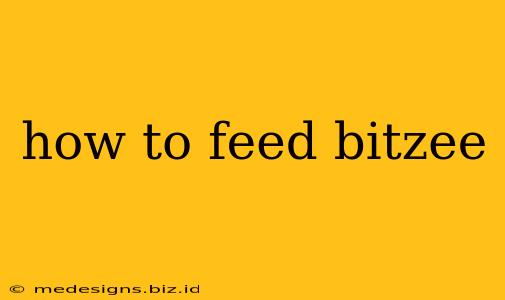So, you've got a Bitzee! Congratulations! These fascinating creatures (assuming "Bitzee" refers to a fictional pet or creature; if it's a real-world item, please clarify) require a specific diet to thrive. This comprehensive guide will walk you through everything you need to know about feeding your Bitzee, ensuring its health and happiness.
Understanding Your Bitzee's Nutritional Needs
Before diving into specific foods, it's crucial to understand your Bitzee's unique dietary requirements. Different Bitzees may have slightly different needs based on age, activity level, and overall health. Observe your Bitzee's behavior; are they energetic or lethargic? Do they seem to prefer certain types of food? This information will help you tailor their diet for optimal well-being. Generally, Bitzees need a balanced diet rich in:
- Energy Sources: These provide the fuel for your Bitzee's daily activities.
- Essential Vitamins and Minerals: Crucial for growth, development, and overall health.
- Proteins: These are the building blocks for muscles and tissues.
- Fiber: Promotes healthy digestion.
Note: Always consult a Bitzee veterinarian or expert for personalized dietary advice, especially if your Bitzee has any pre-existing health conditions.
The Best Foods for Your Bitzee
Now, let's explore the best food choices for your beloved Bitzee. Remember, variety is key to a healthy diet.
Bitzee Pellets:
These commercially produced pellets are a great foundation for your Bitzee's diet. They are usually formulated to provide a balanced mix of nutrients. Look for pellets that are specifically designed for Bitzees and check the ingredient list to ensure it's high-quality and free of harmful additives.
Fresh Fruits and Vegetables:
Supplement your Bitzee's diet with a variety of fresh fruits and vegetables. Some excellent choices include:
- Apples (remove seeds): A good source of fiber and vitamins.
- Bananas (in moderation): Provide potassium and energy.
- Carrots: Rich in beta-carotene and fiber.
- Green leafy vegetables (spinach, kale): Packed with essential nutrients.
Important: Always wash fruits and vegetables thoroughly before feeding them to your Bitzee. Introduce new foods gradually to avoid digestive upset.
Bitzee Treats:
Treats should be given sparingly, as they are high in calories. Use them as rewards for good behavior or to make feeding time more enjoyable. Look for treats specifically formulated for Bitzees.
Feeding Schedule and Portions
Establishing a regular feeding schedule is crucial for maintaining your Bitzee's health. A consistent routine helps regulate their digestive system and prevents overeating. The amount of food you give your Bitzee will depend on factors such as their age, size, and activity level. Here's a general guideline:
- Young Bitzees: May require more frequent, smaller meals.
- Adult Bitzees: Usually fed once or twice a day.
- Older Bitzees: May need a diet adjusted for their slower metabolism.
Always monitor your Bitzee's weight and adjust their food portions as needed to maintain a healthy body condition.
Recognizing Signs of Dietary Issues
It's important to be aware of signs that your Bitzee might have a dietary problem. These include:
- Weight loss or gain: Sudden changes in weight can indicate a problem.
- Changes in stool consistency: Diarrhea or constipation can be a sign of an issue.
- Loss of appetite: A sudden lack of interest in food warrants attention.
- Vomiting or regurgitation: These symptoms should never be ignored.
If you notice any of these signs, consult a Bitzee veterinarian immediately.
Conclusion: Happy and Healthy Bitzees
Feeding your Bitzee correctly is essential for its overall health and happiness. By following these guidelines and paying close attention to your Bitzee's individual needs, you can ensure that your furry (or perhaps scaly, feathery, or otherwise textured!) friend thrives for years to come. Remember to always consult a Bitzee expert or veterinarian for any concerns or questions about your Bitzee's diet.
